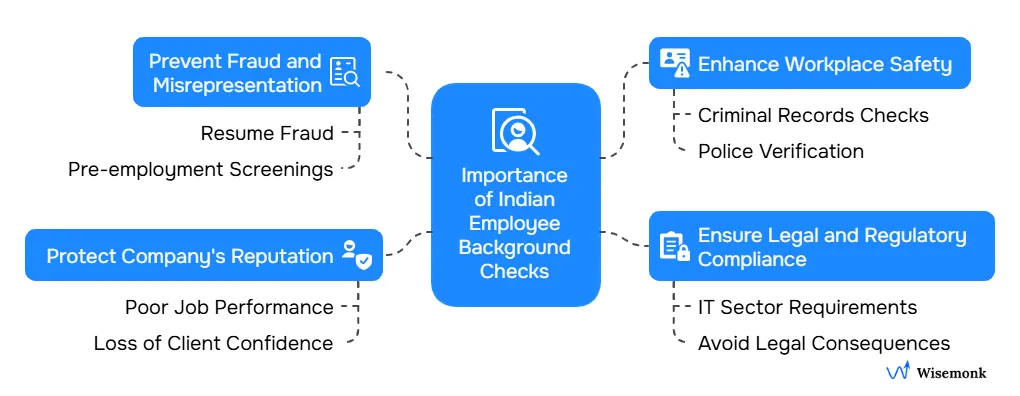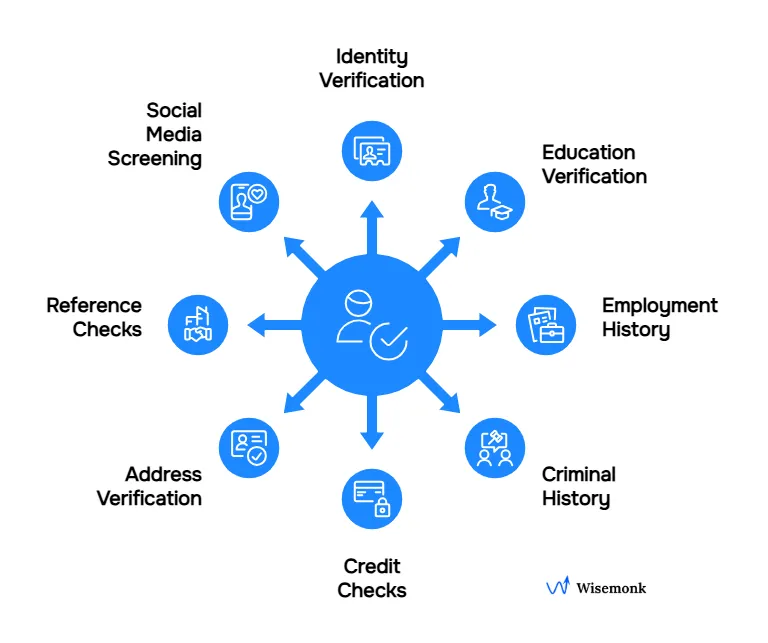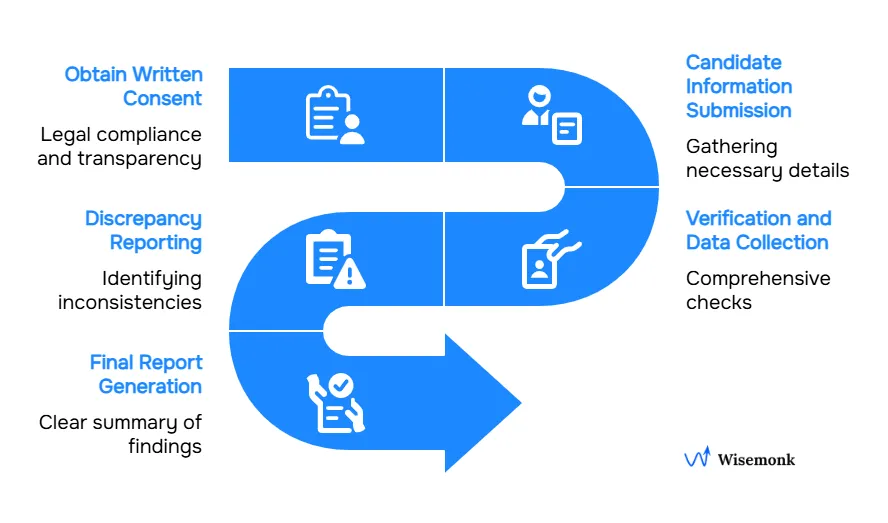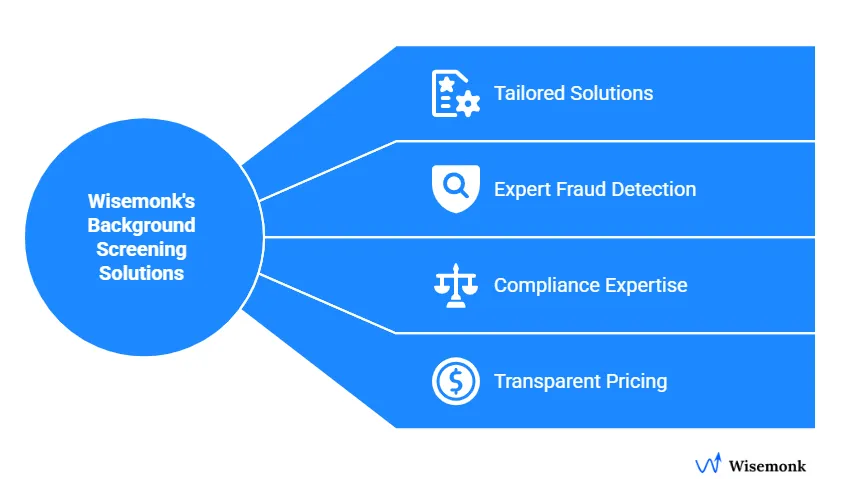- Background Verification (BGV) is a mandatory screening process where Indian employers verify job applicants' identity, education, employment history & criminal records to prevent fraud and ensure workplace safety.
- Key verification components include Aadhaar/PAN identity checks, education verification with institutions, employment history validation, criminal records screening & address verification, with additional checks based on job requirements.
- The process requires written candidate consent and follows structured steps: document collection, multi-channel verification, discrepancy reporting & final report generation within 1 week average timeline.
- Timeline ranges from 1-10 working days depending on check type: identity verification (1-2 days), education/employment (3-7 days), criminal records (5-10 days).
- Major challenges include India's decentralized record systems, slow institutional responses, high prevalence of document fraud, regional administrative variations & complex privacy law compliance requirements.
Need help to run background checks in India? Reach out to us now!
Discover how Wisemonk creates impactful and reliable content.
When you're hiring in India, are you confident you're making the right choice? From resume fraud to decentralized data, conducting background checks in India can be a challenge for even the most experienced employers. This comprehensive guide is designed to walk you through every aspect of the background check process, helping you mitigate risk and hire with confidence.
What is a background check in India?[toc=What is BGV in India]
A background check in India, also known as Background Verification (BGV), is a comprehensive process used by employers to verify the information provided by a job applicant. The goal is to confirm the authenticity of a potential employee's credentials, past employment history, education, and other personal details.
- Mitigates Hiring Risk: It helps companies avoid hiring individuals with fraudulent documents or a history of misconduct.
- Ensures Workplace Safety: It is crucial for maintaining a secure and trustworthy environment, especially in roles with access to sensitive data.
- Validates Candidate Information: The process confirms the accuracy of details on a resume, such as employment history and educational qualifications.
- Builds a Reliable Workforce: By conducting thorough checks, companies demonstrate a commitment to hiring employees with integrity and professional conduct.
Why are background checks important in India?[toc=Importance of BGV]
Background checks are a critical component of the hiring process in India for several reasons. With a large and diverse talent pool, ensuring the authenticity of a job applicant's profile is crucial for risk management and building a reliable workforce.
Based on our experience working with global companies and Indian employers, we have observed that the importance of Indian employee background checks is primarily driven by the need to:

- Prevent Fraud and Misrepresentation: In a highly competitive job market, we have seen a rise in cases of resume fraud. Pre-employment screenings are essential to uncover these discrepancies and protect a company from hiring individuals based on false information.
- Enhance Workplace Safety: Thorough background checks, particularly criminal records checks and police verification, are vital for creating a secure work environment. By screening for criminal history, employers can mitigate the risk of hiring individuals who could pose a threat to their business or colleagues. This is especially true for roles that involve handling sensitive data.
- Ensure Legal and Regulatory Compliance: For many industries, particularly the IT sector, conducting background checks is legally required. Adhering to these regulations and India's privacy laws is essential to avoid legal consequences, fines, and reputational damage.
- Protect the Company's Reputation: A company's reputation is built on trust and integrity. A single bad hire can have a far-reaching negative impact, from poor job performance to a loss of client confidence. By performing thorough background checks and prioritizing professional conduct, organizations can protect their company's reputation and foster a culture of trust.
What information is collected in a background check?[toc=Types of BGV in India]
A comprehensive background check in India is not a one-size-fits-all process; the specific information collected depends on the new hire's role and the level of scrutiny required. However, there are several key data points that are commonly collected to verify a candidate's credibility and qualifications.
As a provider of screening services, we've have observed that the most effective background checks focus on these core areas:

1. Identity Verification
The foundational step of any background check is to confirm the candidate's identity. This involves verifying government-issued documents like Aadhaar, PAN card, or a passport to ensure the job applicant is who they claim to be.
2. Education Verification
This is a crucial check, especially given the prevalence of fraudulent educational qualifications. It involves contacting the educational institutions listed on the resume to confirm the degrees, dates of attendance, and other educational qualifications.
3. Employment History
Employers look to validate a candidate's employment history, which includes verifying past job roles, dates of employment, and responsibilities. This check helps confirm the work experience mentioned on the resume and assesses the candidate's career progression.
4. Criminal History
For workplace safety and compliance, criminal history checks are essential. This process involves police verification and searching court records to see if the candidate has any criminal history or a record of legal issues.
5. Credit Checks:
For roles with financial responsibilities, a credit check is performed to assess a candidate's financial integrity. This review of credit reports and outstanding debts provides insights into a candidate's financial responsibility.
6. Address Verification:
This step ensures the candidate's current and permanent addresses are accurate. This is important for future communication and for confirming the individual's residency.
7. Reference Checks
While subjective, contacting a candidate's provided references can provide valuable insights into their past job performance, work ethic, and professional conduct.
8. Social Media Screening
As a modern addition, some employers conduct a social media screening to review a candidate's social media profiles for any red flags, though this must be done with careful consideration for privacy laws and potential bias.
How is a background check done in India?[toc=BGV Process in India]
The background check process in India is a systematic, multi-step procedure designed to provide employers with a clear and verified picture of a candidate's background.
While the specifics can vary, the general process, when managed by a professional screening services provider, follows these key stages:

Step 1: Obtain Written Consent
This is the most crucial first step. Before any background screening begins, the employer must obtain written consent from the job applicant. This is a legal requirement under India's privacy laws, specifically the Information Technology Act. This consent form clearly outlines what information will be verified and for what purpose, ensuring the collection of sensitive personal information is done transparently and legally.
Step 2: Candidate Information Submission
Once employee consent is secured, the candidate provides the necessary details and documents. This typically includes personal identification documents (Aadhaar, PAN card), educational certificates, and contact information for past employers.
Step 3: Verification and Data Collection
The screening provider then begins the actual verification. This involves a mix of digital and manual processes:
- Education Verification: The provider contacts the educational institutions to confirm the candidate's educational qualifications, degree, and dates of attendance.
- Employment Verification: They reach out to the HR departments of the previous companies to verify employment history, including job titles, tenure, and responsibilities.
- Criminal Record Checks: This is a crucial check done through various sources, including local police station departments and court record databases, to uncover any criminal history.
- Identity and Address Verification: Identity verification is often done through digital platforms linked to government databases, while address verification may involve a physical check or digital methods to confirm the candidate’s residential information.
Step 4: Discrepancy Reporting
If any inconsistencies or red flags are found, such as a different date of employment or an unlisted degree, the provider documents these findings and flags them for the employer.
Step 5: Final Report Generation
All the collected data and findings are compiled into a comprehensive report. This final report provides the employer with a clear summary of the background check results, highlighting any discrepancies and allowing them to make an informed decision on the hiring process.
This structured and meticulous process helps to ensure compliance and accuracy, providing a reliable foundation for making a hiring decision.
How much time does BGV take in India?[toc=Estimated Timeline]
The timeline for background verification in India can vary depending on the type and depth of checks required. Here's a general overview of the typical durations:
Wisemonk streamline the background verification process to deliver results within an average of 1 week, covering all essential checks depending on the complexity of checks required. For urgent hiring needs, we offer expedited services to complete verifications without compromising accuracy or compliance.
What are the key considerations for conducting background checks?[toc=Key Considerations]
Conducting a successful background check in India goes beyond simply verifying information. To ensure the process is effective, ethical, and legally sound, employers must pay close attention to several key considerations.
Our experience assisting international companies has highlighted that these factors are critical for a robust and compliant background screening program:

1. Candidate Consent and Data Privacy:
You must obtain written consent from the candidate before starting any check. Under India's privacy laws, handling sensitive personal data requires explicit permission. Avoid collecting excessive personal data not relevant to the new hire's role and ensure you maintain confidentiality.
2. Compliance with Laws:
It is essential that the background check process is legally compliant with India's privacy laws and other regulations. Partnering with a vendor that is an expert in conducting background checks legally is crucial to ensure compliance and avoid legal consequences.
3. Consistency and Fairness:
A standardized pre-employment screening process should be applied consistently to all job applicants for a given role. This ensures fairness and helps avoid claims of discrimination.
4. Vendor Reliability:
Choosing a reliable background screening vendor is critical. A good partner will have a strong track record, offer thorough background checks, and be committed to data security, minimizing your risk.
5. Relevance to the Role:
Tailor the background screening to the job. For example, a credit check is essential for a role with financial responsibilities, but may not be necessary for others, ensuring the process is efficient and respects the candidate’s privacy.
What are the common India background check mistakes to avoid?[toc=Mistakes to Avoid]
Conducting a background check is a critical part of the hiring process, but several common mistake scan undermine its effectiveness and expose employers to risk.
Based on our experience working with global companies, we have observed that avoiding these pitfalls is crucial for a smooth and compliant process:
- Ignoring Candidate Consent: This is the most significant and frequent mistake. Failing to obtain consent from a job applicant is a violation of India's privacy laws and can lead to severe legal consequences. Always ensure you have clear, written permission before initiating any check.
- A "One-Size-Fits-All" Approach: Not all roles require the same level of scrutiny. Applying the same thorough background checks for an intern as for a senior manager can lead to an excessive collection of data and unnecessary delays. The checks should be tailored to the new hire's role. For instance, credit checks are vital for financial roles, but less so for creative positions.
- Incomplete or Superficial Checks: Simply running a basic criminal record check and nothing else is a mistake. A comprehensive background screening requires a multi-layered approach that includes verifying employment history, educational qualifications, and other relevant data points. Incomplete checks leave you vulnerable to resume fraud and other risks.
- Choosing the Wrong Vendor: The vendor you choose is your partner in this process. Opting for a low-cost or unproven screening services provider can result in inaccurate reports, delays, and poor handling of sensitive personal information. A reliable vendor must be well-versed in India's privacy laws and have a reputation for providing thorough and legally compliant services.
- Failing to Communicate: Lack of transparency with the candidate can create mistrust. If a discrepancy is found, a common background check mistake is to immediately disqualify the person without giving them a chance to explain. Open communication can help resolve minor issues and demonstrate fairness in the hiring process.
What challenges do employers face in background screening in India?[toc=Challenges]
While the importance of employee background checks in India is clear, the process is not without its challenges. Employers often encounter unique hurdles that can complicate and delay the background screening process.
- Lack of Centralized Data: India lacks a single, centralized database for records like criminal history and educational qualifications. This means that information is scattered across different government agencies, local police station departments, and educational institutions, making a thorough background check a manual and time-consuming task.
- Delays and Slow Responses: One of the most common challenges is the slow response from past employers and educational institutions. Many still use manual processes, which can cause significant delays in verifying employment history and educational qualifications.
- Prevalence of Fraudulent Documents: India faces a persistent challenge with resume fraud, including fake degrees and forged experience letters. Identifying these fraudulent documents requires specialized expertise beyond basic verification.
- Regional Complexities: The background check process can vary significantly from one state to another due to different administrative procedures. A one-size-fits-all approach is often ineffective, adding to the complexity of a nationwide background check.
- Data Privacy and Legal Compliance: Navigating India's privacy laws and ensuring that the collection and handling of sensitive personal data are compliant with the Information Technology Act is a significant challenge for many employers.
How does Wisemonk solve these challenges?[toc=How Wisemonk helps]
Wisemonk is a leading Employer of Record (EOR) in India, specializing in helping global companies hire and manage their remote teams seamlessly. We solve the complex challenges of background checks by acting as your local partner, mitigating risks, and ensuring a legally compliant process.
Here's how Wisemonk address the common challenges of background screening in India:

- Tailored Solutions: We conducts thorough checks including identity verification, education and employment history, criminal records, and financial stability assessments. Our extensive network spans all of India, ensuring in-depth verification regardless of a candidate's location.
- Expert Fraud Detection: We go beyond standard checks. Our team is trained to identify forged and fraudulent documents, providing a more reliable and secure background screening.
- Compliance Expertise: We prioritize legal compliance. Our processes are designed to handle sensitive personal information in strict accordance with India's privacy laws, including the requirement to obtain written consent from every candidate.
- Transparent Pricing: We offers transparent pricing to suit your needs with no hidden charges. For just $50, you can get a comprehensive background check, which includes identity verification, education verification, address verification, employment history, criminal record etc.
Beyond BGV, Wisemonk provides a full suite of services to help you build and manage your team in India. We handle compliant payroll and taxes, manage employee benefits, draft and manage employment contracts, and provide dedicated HR support. We offer an end-to-end solution that allows you to hire with confidence and focus on your core business.
Need help running a background check? Connect with an Expert today.
FAQs
Is background verification mandatory in India?
No, a background check is not legally mandatory for all employers in India. However, it is a widely adopted best practice and is required by law in certain regulated industries like banking and finance.
Which is the best BGV company in India?
For businesses seeking a reliable partner for their Indian operations, Wisemonk is a leading BGV company that offers a comprehensive and legally compliant background check process to help you hire with confidence.
For more options, explore our article on: "Top 5 Background Verification Companies in India for 2025".
How far back do background checks go in India?
The look-back period for background checks in India typically spans the last 7 to 10 years. However, this can vary based on the specific type of check and the nature of the role.
What happens if BGV fails in India?
If a background verification fails, the offer of employment is typically revoked. In cases where the employee has already joined, a failed BGV can be a ground for termination.
Which companies do strict BGV in India?
Companies in sectors such as IT, finance, and government organizations are known for having strict BGV processes. Many leading multinational corporations also conduct rigorous background checks as a standard part of their hiring process.
Are background checks legal in India?
Yes, background checks are legal in India, provided they are conducted with the written consent of the candidate. Employers must also adhere to data privacy laws and ensure the information collected is relevant to the job.






.webp)
%20Companies%202026.webp)
